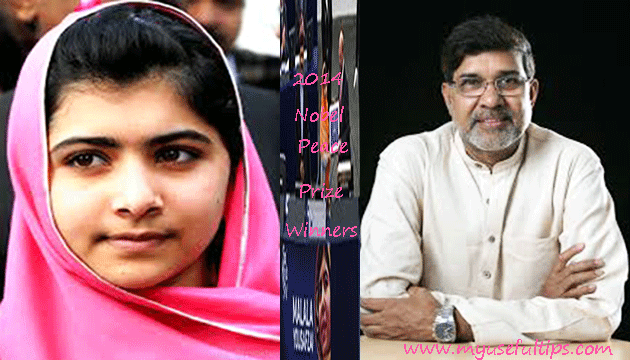India and Pakistan Shares the 2014 Nobel Peace Prize!
The Nobel Peace Prize is probably the most prestigious, well respected and much sought after honors among arts, sciences and humanitarian endeavors. For someone to be nominated by an influential and esteemed organization/individual and chosen by the Norwegian Nobel Committee, he/she must have done a magnificent job of re-creating something ordinary to extraordinary, leading smaller to greater things. Mother Teresa, Aung San Suu Kyi , Albert Einstein, Madame Curie, T.S. Eliot, William Faulkner, and Nelson Mandela were some men and women from diverse backgrounds who luckily brought to their respective homes the said coveted award.
Just like in the past, everyone waited all agog on who will be this year’s Nobel Peace Prize winners, setting off a flurry of speculations of the 279 nominees. Media outlets including broadsheets and the internet displayed the 2 winners from South Asia (Kailash Satyarthi of India and Malala Yousafzai of Pakistan). The news went viral so easily because of media influence placing it as headline in world news last Friday, October 10th. The said award may seem such a big, big deal to some but on the other note majority of the people throughout the globe particularly the disadvantaged themselves may not bother to know about it as they are more interested on how they could realize their dreams of a good life, which is more important and more closer to reality!
So, how do Kailash and Malala differ from the previous Nobel Laureates?
First, their advocacy involves helping children and young people get their views across and take part in decisions that affect their lives. Kailash, a 60-year old man struggled against the oppression of children and young people who are suffering from slavery, bonded labor and trafficking while Malala, a 17-year old girl and the youngest of the Laureates so far bravely fought for the right of all children to education. Malala was shot in the head by masked gunmen in 2012 for defying orders to stop writing a blog campaigning against the Taliban efforts to deny women an education.
Second, they hail from two nations riven by a cycle of violence, an animosity between the Hindus and Muslims primarily due to a disputed territory, Kashmir, which is a Muslim state with a Hindu ruler. The Ind-Pak conflict has been going on for decades, unleashing religious hatred between the two, India being Hindu and Pakistan as Muslim, and killing over hundreds of people already.
Third, Malala and Kailash home countries’ possess nuclear arsenals and are presently in a nuclear arms race. Both India and Pakistan have not been in agreement as to the Nuclear Non-Proliferation Treaty due to their respective weapons programs. Should there be nuclear war between the two, South Asia will not only be adversely affected but the whole world. I can just hope and pray it doesn’t happen and that they will reconcile for the good of all. I have been to these countries and lived there for a while and I have seen how people suffer from poverty.
It was confirmed by no less Nobel Committee head Thorbjoern Jagland that “it is an important point for a Hindu (Indian) and a Muslim (Pakistani) to join in a common struggle for education and against extremism”. How about on peace effort matters? Can the Nobel Peace prize bring peace to South Asia? Do we see bilateral peace talks/agreements between India and Pakistan in the offing?
While the efforts to abolish child labor and to empower/educate children are deemed important, fostering peace and equality is even more necessary in today’s world. I know a lot of work still remains as far as promoting friendly ties and solidarity between India and Pakistan, but with the Nobel Prize, I hope it will bring them closer, pehaps a ceasefire in the Kashmir area!
With the $1.1 million Nobel peace winnings to be shared by Malala and Kailash, I also hope that the said funds would be utilized for the remaining challenges in their struggle for basic human rights, using Mohandas (Mahatma) Gandhi’s non-violence and peaceful means.
Congratulations to you both!

The Nobel Peace Prize Committee definitely knows where to endow their gifts…..and yes, to controversial people and political economies and not necessarily to people in economies who actively advocated for peace process!
India and Pakistan must have considerably lobbied for this coveted award! I am not sure which high profile organizations supported and endorsed their candidates….I wonder what were the conditionalities in exchange for supporting them. I hope the Nobel Peace Prize committee should be more cautious in bestowing the award to more qualified individuals.